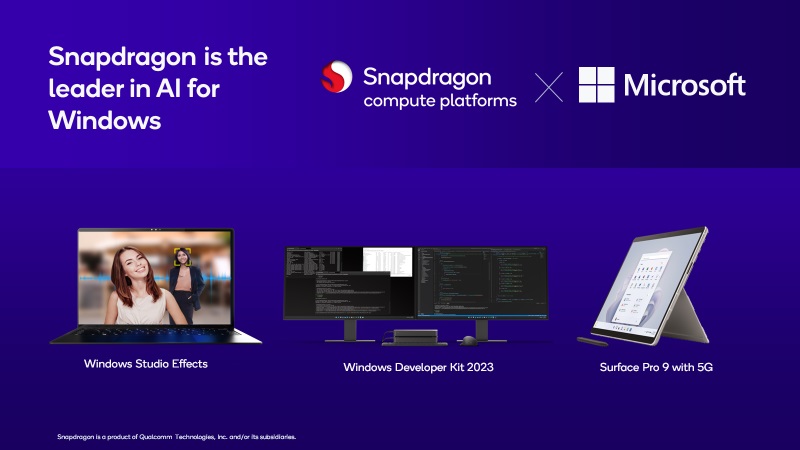At Snapdragon Summit 2022, Qualcomm Technologies outlined its vision to advance mobile computing and revealed technology that will unlock a new generation of AR glasses.
Qualcomm Technologies and Microsoft are advancing AI capabilities and transforming modern laptops with the powerful performance, neural processing and industry-leading efficiency of Snapdragon compute platforms.
This collaboration on Snapdragon has enabled new AI-accelerated experiences for Windows 11 users, including Windows Studio effects such as Voice Focus, Background Blur, Automatic Framing and Eye Contact. The launch of the Surface Pro 9 5G, featuring the Microsoft SQ3 powered by Snapdragon, highlighted those features. Unlike legacy x86-based solutions, Snapdragon intelligently offloads these computationally intensive tasks to a dedicated AI Engine, freeing the CPU and GPU to deliver better performance and power efficiency.

ISV resources like the Snapdragon 8cx Gen 3-powered Windows Developer Kit 2023 make it even easier for developers to utilize the dedicated AI Engine to enhance their experiences, whether that’s through a productivity tool, game or creative app. Adobe used the kit to create its Creative Suite, which utilizes dedicated AI-processing capabilities for more personalized and intuitive experiences that pair with Adobe Sensei. It also announced today that in 2023 even more key Adobe Creative Cloud applications will become native for Windows 11 PCs powered by Snapdragon Compute.
Read more about it on Qualcomm.
The summit also revealed the Snapdragon AR2 Gen 1 Platform, which Qualcomm Technologies built from the ground up for glasses that can be comfortably worn for extended periods of time to meet the demands of both consumers and businesses. The platform ushers in a new era of spatial computing experiences for the real-world/metaverse mix.
Snapdragon AR2 uses a multi-chip architecture that includes an AR processor, AR co-processor and connectivity platform, which helps better balance the weight and decrease the arm width on either side of the glasses, making them as thin as possible. Other advantages of the AR processor include enhanced perception capabilities such as a dedicated hardware acceleration engine that improves user motion tracking and localization. The AR co-processor aggregates camera and sensor data and enables eye tracking and iris authentication to optimize workloads only where the user is looking. This helps reduce power consumption.
Find out more about the platform at Qualcomm.
Source: Windows Blog
—